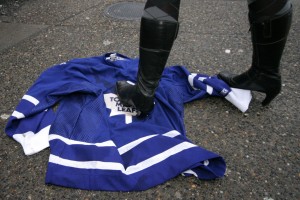Prior to the end of the indefensible NHL lockout, I wrote that the work stoppage had forced me to quit the Toronto Maple Leafs in a way that I couldn’t have done myself, and that I was happy with it.
Fast forward to today: it’s a Saturday; the Leafs are not scheduled to play, and I am incensed that what I thought was a right guaranteed by the Canadian Charter of Rights and Freedoms – the ability to watch the Leafs on a Saturday night – has been infringed upon.
What the hell is wrong with me? What changed?
Well, somewhere along the way, I think the Leafs actually became good. Believe me when I say that I’m almost certain that I’ll regret saying that when, in between the time I write this article and the time it appears in the Obiter Dicta, the Leafs lose six games in a row or something.
Despite losing arguably their most complete player, Joffrey Lupul, to a broken forearm three games into the season (thanks so much for your predictably poorly aimed slapshot, Dion Phaneuf), the Leafs record is 13-9. If they keep winning at that pace, they’ll be a playoff team for the first time since 2004.
 It may all be a mirage, and they may regress, but it doesn’t feel like they will. For the first time in a long time, this team almost always plays smart hockey. They don’t turn the puck over in their own end, they don’t take stupid penalties, and they’re not the worst team in the league at penalty killing (something which has almost become an annual rite of passage). I find myself asking “why did he just do that?” a lot less when watching games than I have in recent years. Their coach, Randy Carlyle, deserves credit for that.
It may all be a mirage, and they may regress, but it doesn’t feel like they will. For the first time in a long time, this team almost always plays smart hockey. They don’t turn the puck over in their own end, they don’t take stupid penalties, and they’re not the worst team in the league at penalty killing (something which has almost become an annual rite of passage). I find myself asking “why did he just do that?” a lot less when watching games than I have in recent years. Their coach, Randy Carlyle, deserves credit for that.
I don’t really agree with fighting in hockey, if only because of the increased awareness of the negative long-term effects of concussions, but it is undeniable that this team has become harder to play against. Their toughness doesn’t just manifest itself in fighting, though that’s something they do with startling regularity. It manifests itself in hitting people and hitting them hard, and wearing down opponents as the game goes on.
What stands out about this team is how coherent their roster is. They have players who are very good at playing a very specific role – James van Riemsdyk scores, Tyler Bozak wins faceoffs, Jay McClement kills penalties, Mark Fraser defends, Mike Brown fights, Leo Komarov hits and Dion Phaneuf misses the net with really hard slapshots. Individually, none of those players are stars; together, though, it works.
Oh, and then there’s Phil Kessel. Say what you want about the enigmatic and shy former Boston Bruin, but do so with the knowledge that he is only 25 years old and will very likely score his 200th goal next season. He hasn’t been great this season, but he’s also been unlucky. His shooting percentage is a paltry 4.9 percent, a far cry from his career mark of 10.5 percent, and he seems to hit more goal posts than should be humanly possible. Kessel is still dynamic, and I have a hard time believing that he won’t go on a prolonged, team-carrying hot streak before the season is over.
There is also young talent on the roster, which makes it easy to believe that this team is only going to get better over time. The aforementioned Kessel, Matt Frattin (with his explosive speed and 7 goals in 10 games prior to being injured), Cody Franson (the best defenseman on the team) and Nazem Kadri represent hope for a team and a fanbase in desperate need of some.
Kadri, only 22 years old and a point-per-game player, has been a revelation. Last year, he was a player that couldn’t find ice time, with the explanation likely being equal parts former coach Ron Wilson being an asshole and Kadri being a defensive liability. This year, though, he is very often the best player on the ice and has more “wow!” moments per game than any recent Maple Leaf.
I’m not delusional, and don’t think that the team is perfect. Their goaltending is still shaky, as both James Reimer and Ben Scrivens are prone to giving up bad goals that necessitate angry texts to friends. They can’t seem to win at home, and sometimes come out flat against teams that a playoff team should beat.
But things are getting better. And, really, it’s about time.

